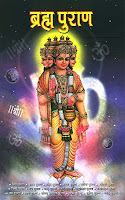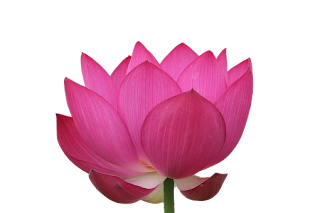महापुराण की महिमा
भारतीय संस्कृति के मूल धारा के रूप में वेदों
के बाद पुराणों का ही स्थान है । वेदों में वर्णित अगम रहस्यों तक जन समान्य की पहुँच
नहीं हो पाती, परंतु पुराणों की मंगल मयी, ज्ञान प्रदायनी दिव्य कथाओं
का श्रवण-मनन और पठन-पाठन कर जन साधारण भी भक्ति तत्व के अनुपम रहस्य से सहज ही परिचित
हो सकते हैं ।
अध्यात्म की ओर अग्रसर होनेवाले साधकों
को पौराणिक कथाओं के अनुशीलन से तत्व ज्ञान की प्राप्ति होती है । इसलिए भगवान के दर्शन
के लिए अथवा शारीरिक मानसिक रोग की निवृत्ति के लिए पुराणों का स्रवण करना चाहिए ।
इनका विस्तार सौ करोड़ श्लोकों का माना
गया है । समय के परिवर्तन से जब मनुष्य की आयु कम हो जाती है और इतने बड़े पुराण का
श्रवण-मनन मनुष्यों के लिए असंभव हो जाता है, तब उन्हें संक्षिप्त करने के लिए भगवान
स्वंय व्यास रूप में अवतरित होकर उन्हें अट्ठारह भागों में बाँट कर चार लाख श्लोकों
में सीमित कर देते हैं । इस प्रकार भगवान व्यास भी पुराणों की रचियता नहीं,
अपितु संक्षेपक या संग्राहक ही सिध्द होते हैं । अत: वेदों की भांति
पुराण भी अनादि माने जाते हैं ।
यहाँ हमने पुराणों से संबंधित पुस्तकें रखींं हैं :
The Brahma Purana
1. ब्रह्म पुराण
2. पद्म पुराण
3. विष्णु पुराण --
(उत्तर भाग - विष्णुधर्मोत्तर)
4. वायु पुराण --
(भिन्न मत से - शिव पुराण)
5. भागवत पुराण --
(भिन्न मत से - देवीभागवत पुराण)
6. नारद पुराण
7. मार्कण्डेय पुराण
8. अग्नि पुराण
9. भविष्य पुराण
10. ब्रह्मवैवर्त पुराण
11. लिङ्ग पुराण
12. वाराह पुराण
13. स्कन्द पुराण
14. वामन पुराण
15. कूर्म पुराण
16. मत्स्य पुराण
17. गरुड पुराण
18. ब्रह्माण्ड पुराणWhat is Puran ?
Puranas are almost like an encyclopedia listing the human achievements in this part of the world till the time they were edited or complied. In every cycle of time the master editor called Veda Vyasa emerges to edit, vet and complied these records. Their significance is enormous even in the present, as they give a peep into the distant past of Hindus when the world was evolving and the psyche of the race was being formed. These puranas record the arguments that make us to decide as to what is holy and what is vile; what is good and what is bad. By going through them we can compare our present day jurisprudence vis-à-vis the ancient norms. Apart from that, they are a huge store-house of information conceiving every subject under the sun. It is with the view of unearthing these gems that the present series of the puranas has been planned.The Brahma Purana
 |
| Rs.99.75 on Amazon Kindle |
The Brahma Purana is
renowned as one of the eighteen major Puranas genre of Hindu texts in Sanskrit
language. Puranas are ancient texts that hold major significance in the
spiritual path of the Hindus.There are 18 Maha Puranas in Hinduism. These
puranas enlightens readers about religion, essence of human life through tales
and various sort of narrations. As ancient Hindu texts these Puranas eulogize
various deities in Hinduism through divine stories.
The Padma Puran
 |
| Rs.210.00 on Amazon Kindle |
 |
| Rs.205.00 on Amazon Kindle |
पद्म पुराण’ हिन्दू धर्म के प्रसिद्ध
धार्मिक ग्रंथों में विशाल पुराण है। केवल स्कन्द पुराण ही इससे बड़ा है। इस पुराण
के श्लोकों श्लोक की संख्या पचास हज़ार है। वैसे
तो इस पुराण से संबंधित सभी विषयों का वर्णन स्थान विशेष पर आ गया है, किन्तु इसमें प्रधानता उपाख्यानों और कथानकों की है।ये कथानक
तीर्थों तथा व्रत सम्बन्धी नहीं हैं, वरन् पौराणिक पुरुषों और राजाओं से
सम्बन्धित हैं।अन्य पुराणों में यही कथानक जिस रूप में प्राप्त होते हैं, यहाँ ये दूसरे रूप में हैं। ये आख्यान और उपाख्यान सर्वथा नवीन, विचित्र और सामान्य पाठकों को चमत्कृत कर देने वाले हैं।
The Vishnu Purana
 |
| Rs.126.00 on Amazon Kindle |
 |
| Rs.653.00 Amazon |
The Vishnu Purana is among the shorter Purana texts, with about 7,000 verses in
extant versions. It primarily centers around the Hindu god Vishnu and his
avatars such as Krishna, but it praises Brahma and Shiva and asserts that they
are one with Vishnu. The Purana, states Wilson, is pantheistic and the ideas in
it, like other Puranas, are premised on the Vedic beliefs and ideas. Vishnu
Purana, like all major Puranas, attributes its author to be sage Veda Vyasa.
The actual author(s) and date of its composition are unknown and contested.
Estimates range of its composition range from 1st millennium BCE to early
2nd-millennium CE.
